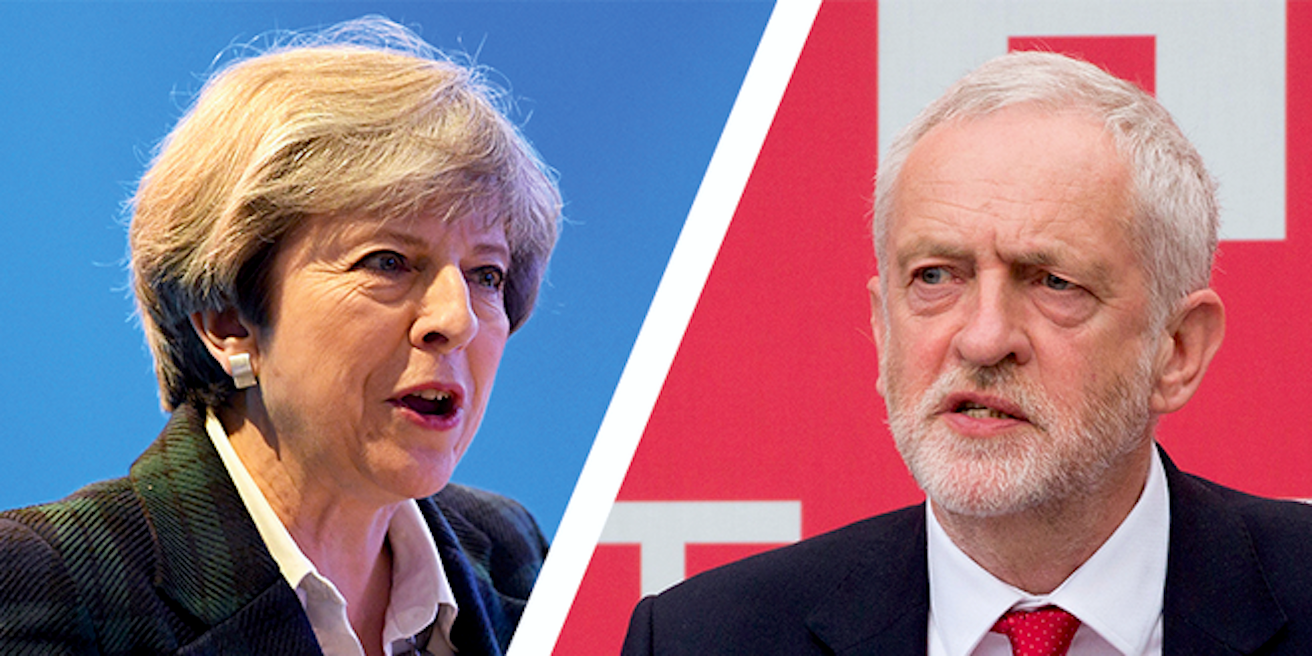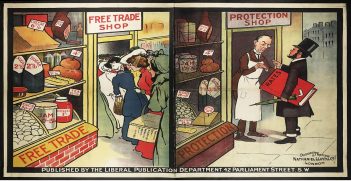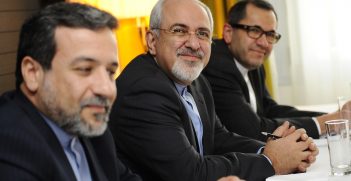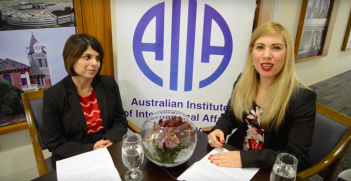An Unlikely Union: Corbyn and May Trade Talks

As she shunts down a single-track line towards Brexit—at the speed of a New South Wales coal train—the British Prime Minister faces, at best, a dangerous derailment or more likely a wreckage.
Even before this week, it was hard to see how Theresa May could possibly make a success of the United Kingdom’s narrow referendum decision to leave the European Union (EU). Two recent events have conspired to make that goal almost unachievable.
The most important was an unambiguous statement by Jeremy Corbyn, leader of the opposition Labour Party, that the party would mandate its members in the House of Commons to oppose any deal with the EU that did not allow Britain to remain within the 27-nation customs union.
Under pressure from hard-right Brexiters in her cabinet and back-benches, May has insisted unequivocally that Britain must leave the customs union and the wider single market. She argues that to remain inside the union would limit the ability to negotiate separate trade deals for Britain with countries such as the United States, China, Japan and Australia.
Corbyn’s move was a long time coming. The Labour leader has enjoyed extending the uncertainty while a ‘civil war’ raged in the Tory party. It has created a dangerous situation for May: there are enough Tory rebels likely to cross the floor of the Commons to defeat her government on the customs union issue, creating further mayhem. Just for good measure, the House of Lords will also support the Labour position.
The second trigger for a potential train wreck was May’s own attempt last weekend to unite her cabinet during an eight-hour “away day” at her country retreat, Chequers. During the long months of negotiations, May has held back from involving even her own supporters. As one Cabinet minister told the Sunday Times’ political editor Tim Shipman: “She does treat everyone equally. She keeps everyone in the dark”.
At Chequers, May apparently asked an official, Oliver Robbins, to outline a hybrid plan for a way forward without a customs union, but with some of its benefits. Under this plan, Britain would remain fully involved in EU agencies governing areas such as aviation, chemicals, pharmaceuticals, medical/scientific research and the Euratom (European Atomic Energy Community) and would continue to contribute more than its fair share towards NATO, including Europe’s defence arrangements. Britain would maintain substantially similar rules and regulations to those within the EU. There would be a new disputes system to resolve difficult issues, outside the European Court of Justice.
It is doubtful if such an approach will cut much ice with the EU’s Chief Negotiator, Michel Barnier, especially as European Commission President Donald Tusk, who would like to find a settlement with Britain, has already warned against cherry-picking.
But even if it did form some basis for discussion, an arrangement that would amount to a compromise has already been ruled out by the European Research Group, in a letter to May signed by 62 Tory MPs, including four former cabinet ministers. Organised by Jacob Rees-Mogg, the most implacable of MPs in favour of a clean break from the EU (known as a hard Brexit), the letter is almost impudent in its tone, demanding that the prime minister sticks to her resolve to leave the single market and the customs union. In other words, any compromise is dead in the water.
Other actors have entered the stage in the last few days, ahead of May’s speech on “what Britain wants”, in Newcastle this coming weekend. They include: top business groups; an irritable foreign secretary, Boris Johnson; a frustrated and flailing international trade secretary, Liam Fox; the Archbishop of Canterbury; and, fleetingly, Australia’s foreign minister, Julie Bishop.
Most significant were the interventions of the Confederation of British Industry (CBI) and the Institute of Directors. Both strongly supported Corbyn’s policy switch to keep Britain in the customs union. Carolyn Fairbairn, CBI director-general, said Corbyn’s commitment to a customs union would “put jobs and living standards first by remaining in a close economic relationship with the EU”.
Ms Fairbairn’s comments and parallel remarks by other employers’ bodies and the trade union movement provoked an outburst by Fox, whose wildly ambitious plans to secure bilateral trade deals across the world have bemused Whitehall officials. Fox, who has flown round the world eight times in 18 months chasing trade deals and courting publicity, was last week canvassing the idea of Britain joining the revived Trans-Pacific Partnership, an unlikely prospect given the country’s distance from the Pacific Rim.
Fox said he was shocked that business could support a sellout by Labour which, if it became policy, would mean he would have one hand tied behind his back in negotiating new trade deals. Almost on cue, the international trade secretary was dumped on by Martin Donnelly, former permanent secretary to the department of trade, who said there was a marked lack of evidence that leaving the EU’s single market and customs union would lead to greater trade with third party countries. He compared the situation to “leaving a three-course meal now in favour of the promise of a packet of crisps later”.
Although she made a serious and interesting speech on foreign affairs at King’s College London, Julie Bishop’s visit will probably be remembered for a publicity stunt. Our super-fit foreign minister, suitably kitted out, jogged around Regent’s Park with a huffing and puffing Boris Johnson, before posing for a friendly hug with her opposite number.
Bishop brought joy to Johnson’s beanie-protected ears by saying Britain should not remain in the customs union and expressed Australia’s readiness to negotiate a free trade deal with Fox, despite Minister for Trade Steve Ciobo’s preference to secure an EU deal first. However, there was a sting in the tail, as Bishop said any deal with Britain would have to include more business, student and work visas for Australians who wished to live in the UK. Bishop also stressed no deal was possible until after Britain left the EU.
And then there was the Archbishop of Canterbury. For various reasons, the Church of England has lost much support in England. Nevertheless, May is a devout follower and will no doubt have paid attention to the words of Justin Welby in his new book Reimagining Britain. The archbishop described diehard remainers as apocalyptic in their Brexit forecasts and compared them to Marvin the depressed robot from the Douglas Adams book Hitchhiker’s Guide to the Galaxy.
It is impossible to know where or when Brexit will end up. There will be more drama and more setbacks in coming weeks and months. The government may well be defeated in parliament, but this in itself will not end the divisions and rifts. Britain is now committed to fixed terms of parliament, so any vote of confidence must specifically revoke that, and even rebelling Tories are unlikely to vote for a motion that almost certainly would allow Corbyn to become prime minister.
So this week is just one more scene in a long saga; meanwhile, the British people are left to ponder the fact that the best deal—and the one that has given them the most competitive advantage—is their membership of the EU, now fast running out.
Colin Chapman is a writer, broadcaster and public speaker who specialises in geopolitics, international economics and global media issues. He is a past president of AIIA NSW and was recognised as a fellow of the AIIA in 2017.
This article is published under a Creative Commons Licence and may be republished with attribution.





